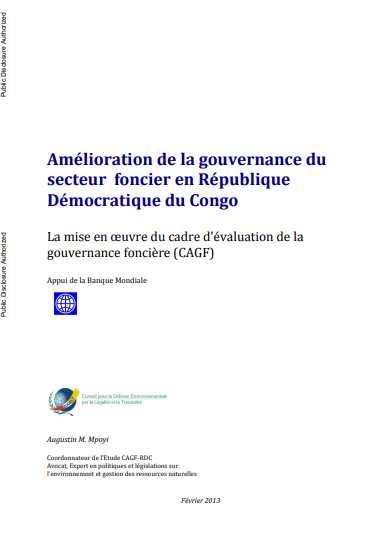The World Bank is a vital source of financial and technical assistance to developing countries around the world. We are not a bank in the ordinary sense but a unique partnership to reduce poverty and support development. The World Bank Group has two ambitious goals: End extreme poverty within a generation and boost shared prosperity.
- To end extreme poverty, the Bank's goal is to decrease the percentage of people living on less than $1.25 a day to no more than 3% by 2030.
- To promote shared prosperity, the goal is to promote income growth of the bottom 40% of the population in each country.
The World Bank Group comprises five institutions managed by their member countries.
The World Bank Group and Land: Working to protect the rights of existing land users and to help secure benefits for smallholder farmers
The World Bank (IBRD and IDA) interacts primarily with governments to increase agricultural productivity, strengthen land tenure policies and improve land governance. More than 90% of the World Bank’s agriculture portfolio focuses on the productivity and access to markets by small holder farmers. Ten percent of our projects focus on the governance of land tenure.
Similarly, investments by the International Finance Corporation (IFC), the World Bank Group’s private sector arm, including those in larger scale enterprises, overwhelmingly support smallholder farmers through improved access to finance, inputs and markets, and as direct suppliers. IFC invests in environmentally and socially sustainable private enterprises in all parts of the value chain (inputs such as irrigation and fertilizers, primary production, processing, transport and storage, traders, and risk management facilities including weather/crop insurance, warehouse financing, etc
For more information, visit the World Bank Group and land and food security (https://www.worldbank.org/en/topic/agriculture/brief/land-and-food-security1
Resources
Displaying 2896 - 2900 of 4907Turkey - Transport Sector Expenditure Review : Synthesis Report
Turkey is an upper-middle income country
with a population of 73 million. It has a diversified
economy with a strategic geographical position, located on
the southeastern side of Europe and southwestern side of
Asia. Continued economic growth, combined with increases in
the urban population, will place increasing demands on
Turkey's transport infrastructure. High middle income
countries such as Turkey typically see very rapid increases
Climate Change and Agriculture in Latin America, 2020-2050 : Projected Impacts and Response to Adaptation Strategies
The impacts of climate change on
agriculture are projected to be significant in coming
decades, so response strategies, and their likely costs,
should be evaluated now. That is why this study produced an
open-access, crop-climate-economic impact modeling platform
for Latin America and the Caribbean, that can be extended to
other regions, then modified and improved by users as new
crop, climate, and economic datasets become available. The
The Future of Water in African Cities : Why Waste Water? Integrated Urban Water Management, Background Report
The primary objective of this report is
to provide a coherent and comprehensive review on integrated
urban water management (IUWM) approach to assist public
authorities to identify and address the future challenges of
urban water supply, sanitation and flood management in
African cities. This report presents the existing and future
challenges in Africa, the possible options for innovative
technologies and approaches for their breakthrough and a way
Sustainable Low-Carbon City Development in China
Cities contribute an estimated 70
percent of the world's energy-related greenhouse gases
(GHG). Their locations, often in low-elevation coastal
zones, and large populations make them particularly
vulnerable to the impacts of climate change. But cities
often take steps, even ahead of national governments, to
reduce GHG emissions. So it is with China's cities,
which are well placed to chart a low-carbon growth path to
Amélioration de la gouvernance du secteur foncier en République Démocratique du Congo : La mise en oeuvre du cadre d'évaluation de la gouvernance foncière (CAGF) (French)
The Land Governance Assessment Framework (LGAF) is a diagnostic tool to assess the status of land governance at country level using a participatory process that draws systematically on existing evidence and local expertise rather than on outsiders.







